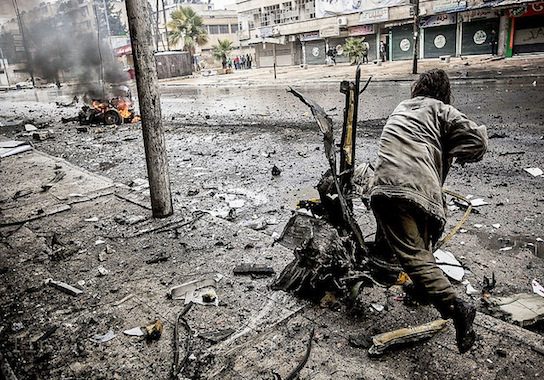“This Is a Dirty War”

The Economist’s Erasmus blog marked Wednesday as the 100th day since rebels abducted two Christian bishops from Aleppo. No one knows their fate. “As the blood-letting in Syria grows ever more polarised between extremes,” writes the author, “the position of anyone who stands in the middle is becoming increasingly unbearable.”
This quote shows the messy and tragic side of Syria’s war that the media so often fails to capture. In the fight for freedom, sectarian violence and religious persecution have plagued various areas of the country. Massacres and cruelty have plagued both sides. Unfortunately, the media and political figures have been quick to adopt “a side,” rather encapsulate the growing tragedy of the situation.
It is this twisted and chaotic reality that freelance reporter Francesca Borri addressed in a Columbia Journalism Review article last week. After more than a year of freelancing in Syria, she writes despairingly of distorted media coverage and frenzied violence:
“This is a dirty war, a war of the last century; it’s trench warfare between rebels and loyalists who are so close that they scream at each other while they shoot each other. The first time on the frontline, you can’t believe it, with these bayonets you have seen only in history books. Today’s wars are drone wars, but here they fight meter by meter, street by street, and it’s f—-g scary.”
President Bashar al-Assad is certainly to blame for much of the country’s turmoil. When the country’s revolution began in 2011, he repeatedly used lethal violence against protesters. He has allowed indiscriminate attacks on combatants and civilians, including the massacre of 45 women and children in Homs last year. Those who support the call to arm rebels quickly point out these accounts of regime atrocity.
However, the Syrian resistance is leaderless and fragmented. Some, according to Senator Rand Paul, are jihadist groups. There is no organized, cohesive movement in Syria to support: “Any attempt to aid the Syrian rebels would be complicated and dangerous, precisely because we don’t know who these people are,” Paul wrote for Politico. “…No question, the Assad regime has committed monstrous atrocities. But this does not mean that the Syrian rebels are in any sense the ‘good guys.’”
Who are the good guys in Syria? Unfortunately, many are men like Father Paolo Dall’Oglio, a critic of the Assad regime reportedly kidnapped by rebels close to al-Qaeda. They are the men and women who stand “in the middle,” the very place that is “becoming increasingly unbearable” in this polarized country.
Their stories of quiet and fearful dissent paint a more vivid and complex picture of Syrian warfare. But as Borri writes, “The editors back in Italy only ask us for the blood, the bang-bang. I write about the Islamists and their network of social services, the roots of their power—a piece that is definitely more complex to build than a frontline piece. I strive to explain, not just to move, to touch, and I am answered with: ‘What’s this? Six thousand words and nobody died?’”
Comments